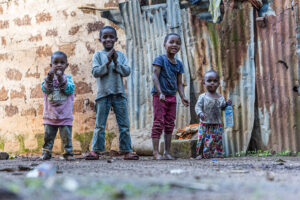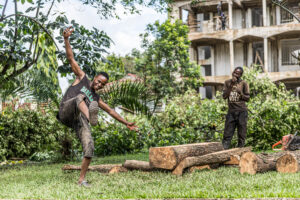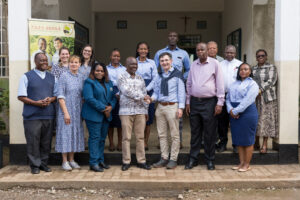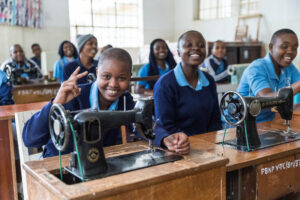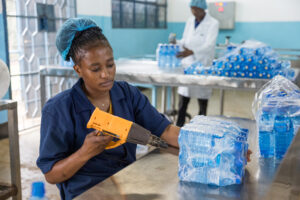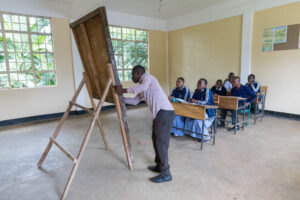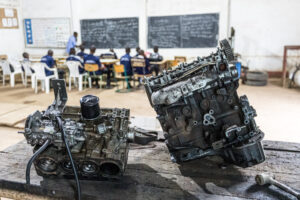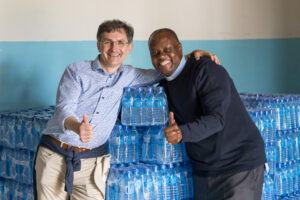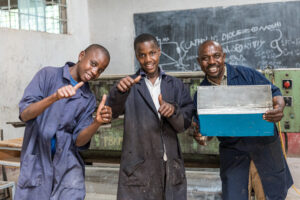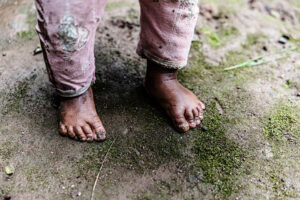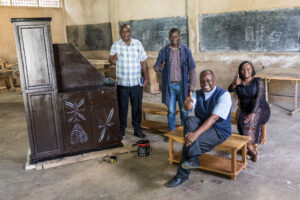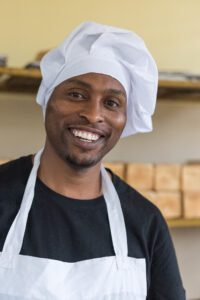
Status Report – Tanzania August 2025
Dear friends of P.A.P.A. Bridge
We would like to share with you the latest insights from our project in Kilema, Tanzania, based on our visits in May and July of this year.
Summary
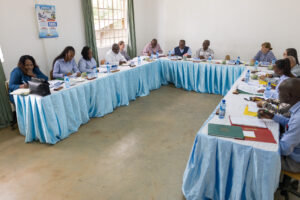 In May, we visited the village of Kilema in Tanzania with a group of four people. We spent two full days at the vocational school and also held a board meeting chaired by Mr. Gasper Njuu. Mr. Gasper, together with Father Aidan, is working intensively in the background on the vocational school’s strategy and is also setting all the key course of action in consultation with our association. The meeting was characterized by an intensive discussion about the further development of our school and, in particular, how we can take a step closer to self-financing.
In May, we visited the village of Kilema in Tanzania with a group of four people. We spent two full days at the vocational school and also held a board meeting chaired by Mr. Gasper Njuu. Mr. Gasper, together with Father Aidan, is working intensively in the background on the vocational school’s strategy and is also setting all the key course of action in consultation with our association. The meeting was characterized by an intensive discussion about the further development of our school and, in particular, how we can take a step closer to self-financing.
Ongoing School Operations
The current situation is dominated by the enrollment of our new principal, Hubert Makundi. Unfortunately, a new principal had to be appointed because our former principal, Walter Kessy, passed away unexpectedly and suddenly at the end of last year 2024 due to health reasons. We would like to take this opportunity to sincerely thank him for his short but very dedicated service to our vocational school – may God grant him peace and repose – and we also pray for his bereaved family.
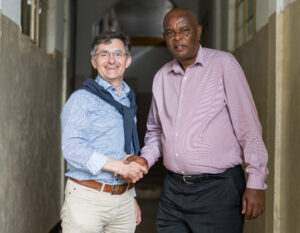 Our new principal, Hubert Makundi, worked for many years for VETA; VETA is the government’s umbrella organization responsible for supporting all vocational schools in Tanzania. He recently retired, but nevertheless agreed to take on the role of principal on an interim basis. He has been appointed as the new principal since March 17, 2025, and has been hired for approximately twelve months. This gives us enough time to calmly find a permanent successor to Walter Kessy.
Our new principal, Hubert Makundi, worked for many years for VETA; VETA is the government’s umbrella organization responsible for supporting all vocational schools in Tanzania. He recently retired, but nevertheless agreed to take on the role of principal on an interim basis. He has been appointed as the new principal since March 17, 2025, and has been hired for approximately twelve months. This gives us enough time to calmly find a permanent successor to Walter Kessy.
Looking at the school’s overall situation, we can say that we are making excellent progress in the area of training. However, we still have a lot of catching up to do in the area of production (Business Development Center, or BDC for short).
Regarding training and school operations
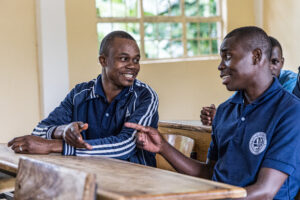 All students passed the last VETA final exams in December 2024, which is already quite good. However, we would like to achieve more A-grades, i.e., top marks, in terms of grades – that is our next goal. The better our students perform in the state exams, the better the reputation of the vocational school, and the easier it is for graduates to find jobs. In terms of student numbers, we have fallen somewhat, from 270 students last year to 220 currently. Therefore, we need to launch an initiative to attract more young people to our vocational school so that we can increase the student population to 300. This will give us better utilization of the school campus, higher tuition fees, and thus easier financing of ongoing operations. The challenge here is to gain a clear advantage in competition with public vocational schools, as they do not charge tuition fees. This makes public vocational schools more attractive to students at first glance, but they tend to be inferior in terms of equipment and quality of training – this is our advantage.
All students passed the last VETA final exams in December 2024, which is already quite good. However, we would like to achieve more A-grades, i.e., top marks, in terms of grades – that is our next goal. The better our students perform in the state exams, the better the reputation of the vocational school, and the easier it is for graduates to find jobs. In terms of student numbers, we have fallen somewhat, from 270 students last year to 220 currently. Therefore, we need to launch an initiative to attract more young people to our vocational school so that we can increase the student population to 300. This will give us better utilization of the school campus, higher tuition fees, and thus easier financing of ongoing operations. The challenge here is to gain a clear advantage in competition with public vocational schools, as they do not charge tuition fees. This makes public vocational schools more attractive to students at first glance, but they tend to be inferior in terms of equipment and quality of training – this is our advantage.
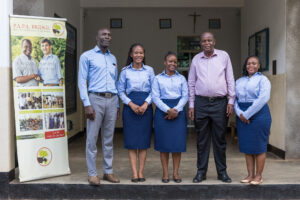 As for the teaching staff, we can say that we have capable teachers in every subject area, although unfortunately, fluctuation is still too high. This is because good teachers are being lured away from public schools by paying higher salaries. We must address this difficult situation. In any case, it is not yet entirely clear whether the existing team has the necessary mindset to take our school to the next level of excellence. In this regard, the new principal, Hubert Makundi, is now required to assemble “a dream team” in a short time or to restructure the existing team.
As for the teaching staff, we can say that we have capable teachers in every subject area, although unfortunately, fluctuation is still too high. This is because good teachers are being lured away from public schools by paying higher salaries. We must address this difficult situation. In any case, it is not yet entirely clear whether the existing team has the necessary mindset to take our school to the next level of excellence. In this regard, the new principal, Hubert Makundi, is now required to assemble “a dream team” in a short time or to restructure the existing team.
Finances
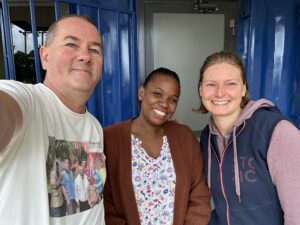 First of all, we are pleased to report that there is a new financial controller who is already doing very good work. Her name is Jesca Loshiro. This personnel change was necessary, because the accounting and the financial figures provided in recent months had not been prepared professionally enough. With the new controller, we now aim to manage the finances in a much more transparent way.
First of all, we are pleased to report that there is a new financial controller who is already doing very good work. Her name is Jesca Loshiro. This personnel change was necessary, because the accounting and the financial figures provided in recent months had not been prepared professionally enough. With the new controller, we now aim to manage the finances in a much more transparent way.
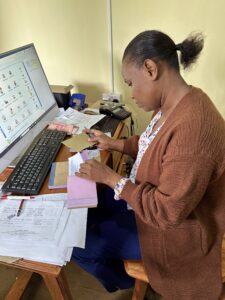 We receive the vocational school’s production financial figures once a quarter and the annual financial statements once a year. We discussed both financial controlling processes at the advisory board meeting. The annual financial statements for 2024 show a largely balanced result with revenues of approximately EUR 200,000. However, around 40% of our current income comes from our PAPA-Bridge organization in Austria – meaning it’s funded by donations. This shows that we still have to work hard in the production area to fully finance our school.
We receive the vocational school’s production financial figures once a quarter and the annual financial statements once a year. We discussed both financial controlling processes at the advisory board meeting. The annual financial statements for 2024 show a largely balanced result with revenues of approximately EUR 200,000. However, around 40% of our current income comes from our PAPA-Bridge organization in Austria – meaning it’s funded by donations. This shows that we still have to work hard in the production area to fully finance our school.
The financial figures for production show quarterly revenue of EUR 18,000 in Q1/2025. This is despite a quarterly profit of only around 8% of revenue, or approximately EUR 1,300. This is worse than last year. This also explains, why we have to work hard to scale up revenue in the production areas. In the following sections, we explain the measures we are taking, to achieve this.
Production Departments – Business Development Center (BDC)
As already mentioned, we have fallen behind in the BDC production areas. The Sales, the profits, and the quality of the delivered products are still unsatisfactory. So, we would like to highlight the most important measures here:
Bricklayer Training and Brick Production
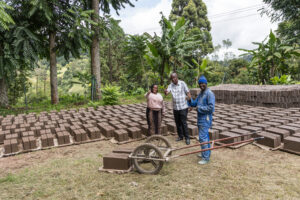 There has been only minimal improvement here since our last visit. The current production capacity is 800 bricks per day, but only approximately 5,000 pcs are sold per month. A new brick mold was recently put into operation in production, which is intended to open up new projects. Our new production target is now 20,000 bricks per month, which can actually be produced with the current resources available. Therefore, our challenge in this area is primarily a sales and marketing challenge, rather than a production one. Therefore, the BDC team will implement sales initiatives to sell significantly more bricks.
There has been only minimal improvement here since our last visit. The current production capacity is 800 bricks per day, but only approximately 5,000 pcs are sold per month. A new brick mold was recently put into operation in production, which is intended to open up new projects. Our new production target is now 20,000 bricks per month, which can actually be produced with the current resources available. Therefore, our challenge in this area is primarily a sales and marketing challenge, rather than a production one. Therefore, the BDC team will implement sales initiatives to sell significantly more bricks.
Metalworking
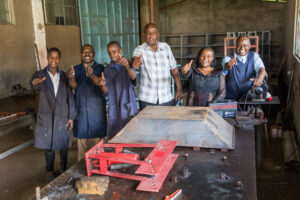 Several projects and tenders have been successfully implemented in this area in recent months. The quality of the products is good enough, but could be a bit better; this needs to be worked on.
Several projects and tenders have been successfully implemented in this area in recent months. The quality of the products is good enough, but could be a bit better; this needs to be worked on. 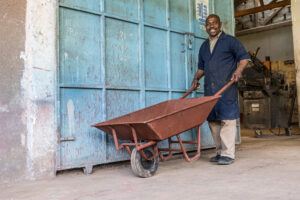 To achieve this, the responsible teacher, Mr. Castro, will sharpen his focus in this area again; he had been helping out with water production in the meantime, which had distracted him. It is encouraging that the earnings situation and profitability in the metalworking shop are really very good. Thus, intensifying sales activities will certainly pay off.
To achieve this, the responsible teacher, Mr. Castro, will sharpen his focus in this area again; he had been helping out with water production in the meantime, which had distracted him. It is encouraging that the earnings situation and profitability in the metalworking shop are really very good. Thus, intensifying sales activities will certainly pay off.
Carpentry
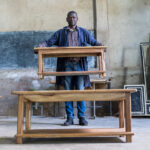 A new teacher has been brought on board to strengthen the team, as they want to secure more projects to further optimize the utilization of the carpentry shop. The machines and infrastructure easily accommodate this. We hope that an increase in the number of projects will work for the team. This is important, because the profitability in the carpentry shop is also very good, and scaling up makes perfect sense.
A new teacher has been brought on board to strengthen the team, as they want to secure more projects to further optimize the utilization of the carpentry shop. The machines and infrastructure easily accommodate this. We hope that an increase in the number of projects will work for the team. This is important, because the profitability in the carpentry shop is also very good, and scaling up makes perfect sense.
Agriculture and Animal Husbandry
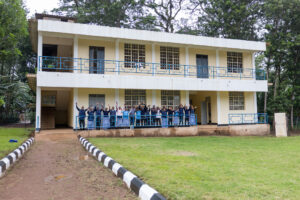 The new building has been completed and furnished. Up to 60 students could be brought on board for this new course. However, we currently only have 20 students; So, we still have room for improvement. Classes are running according to plan, and we have a very good specialist teacher on our team.
The new building has been completed and furnished. Up to 60 students could be brought on board for this new course. However, we currently only have 20 students; So, we still have room for improvement. Classes are running according to plan, and we have a very good specialist teacher on our team. 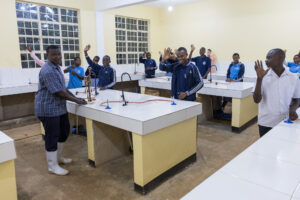 The agriculture department is doing well, and the students are acquiring the necessary knowledge through practical training in the field. On the livestock side, there is a small chicken farm (with egg production) and a pig farm – these are going very well. The next steps are: an incubator system for raising chickens, and then the establishment of a large-scale chicken farm. They also hope to invest in their own cows so that they can also practice livestock farming at the vocational school.
The agriculture department is doing well, and the students are acquiring the necessary knowledge through practical training in the field. On the livestock side, there is a small chicken farm (with egg production) and a pig farm – these are going very well. The next steps are: an incubator system for raising chickens, and then the establishment of a large-scale chicken farm. They also hope to invest in their own cows so that they can also practice livestock farming at the vocational school.
Bakery
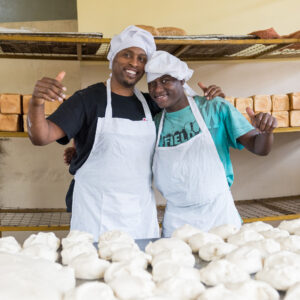 The bakery has taken initial steps toward optimization, as rising material costs have significantly reduced margins. Essentially, a new moped-type tricycle was purchased to deliver bakery products to customers at significantly lower costs. This is now working very well. Unfortunately, the situation regarding purchasing prices for materials has not yet been resolved.
The bakery has taken initial steps toward optimization, as rising material costs have significantly reduced margins. Essentially, a new moped-type tricycle was purchased to deliver bakery products to customers at significantly lower costs. This is now working very well. Unfortunately, the situation regarding purchasing prices for materials has not yet been resolved. 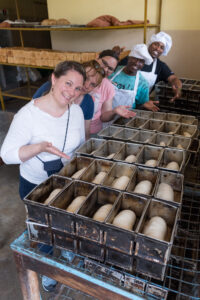 Therefore, the goal now is to optimize production processes and achieve a reduction in purchasing prices. We want to achieve this by significantly increasing production volume from the current 600 loaves per day to 1,200 loaves per day (economics of scale). This increase will primarily be achieved by introducing a second production shift; this has been discussed for some time, but has not yet been implemented. We hope that this important step will now be taken.
Therefore, the goal now is to optimize production processes and achieve a reduction in purchasing prices. We want to achieve this by significantly increasing production volume from the current 600 loaves per day to 1,200 loaves per day (economics of scale). This increase will primarily be achieved by introducing a second production shift; this has been discussed for some time, but has not yet been implemented. We hope that this important step will now be taken.
Water Bottling
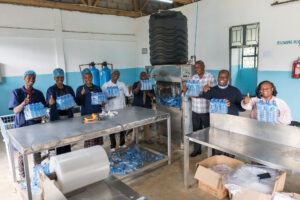 The water bottling project has been very slow to develop, especially since we had to wait a long time for the necessary certificates and licenses. A year ago, we thought we were already through with this approval process, but this turned out to be a missjudgement. Unfortunately, it took until recently for us to finally receive the necessary certificates. Production can now ramp up. The current pre-series production yields an output of max. 1,200 bottles per shift per day. Initial calculations show that we cannot yet generate profits with this volume, as the manufacturing processes and material purchasing cannot be optimized with these small quantities.
The water bottling project has been very slow to develop, especially since we had to wait a long time for the necessary certificates and licenses. A year ago, we thought we were already through with this approval process, but this turned out to be a missjudgement. Unfortunately, it took until recently for us to finally receive the necessary certificates. Production can now ramp up. The current pre-series production yields an output of max. 1,200 bottles per shift per day. Initial calculations show that we cannot yet generate profits with this volume, as the manufacturing processes and material purchasing cannot be optimized with these small quantities.
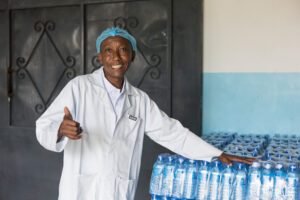 Therefore, the following steps are necessary:
Therefore, the following steps are necessary:
First: Invest in a strong new air-compressor for the bottle production, because the old one broke down, based on overload.
Second: Hire a professional production manager to lead and continuously develop this water production process.
With these two measures, daily production with three shifts could be increased by three-times. We are excited to see how this important project develops!
The following areas are running consistently so far and are supported by us as needed:
Electrician training, mechanic/driving school, tailoring, cooking training – canteen, plumber training, IT, tourism training, sales shop/wholesale (for BDC)
Sponsorship Program
 Our sponsorship program/Godfather program is going very well. It is a vitally important contribution to the truly poor families in the village, as we want to give talented, poor children the opportunity to learn a valuable trade in our school. This way, we lift them out of poverty. We currently have 80 direct school sponsorships in place and an additional 20 pool sponsorships that are not assigned to a specific child. We would like to take this opportunity to thank everyone who actively supports us as sponsor parents!
Our sponsorship program/Godfather program is going very well. It is a vitally important contribution to the truly poor families in the village, as we want to give talented, poor children the opportunity to learn a valuable trade in our school. This way, we lift them out of poverty. We currently have 80 direct school sponsorships in place and an additional 20 pool sponsorships that are not assigned to a specific child. We would like to take this opportunity to thank everyone who actively supports us as sponsor parents!
THANK YOU!
At this point, we would like to express our sincere gratitude to all donors and friends of PAPA-Bridge who have supported us so actively to date! And at the same time, we would like to express our sincere request to reach out to as many more people as possible to ensure the necessary financial support for the people in need in Kilema – ASANTE SANA!
Warm greetings and God’s blessings,
Walter Koch – Chairman
Father Aidan – Project Management Tanzania
Josef Windisch – Vice Chairman
Claudia Schanes – Sponsorship Program
and the entire PAPA-Bridge Board

